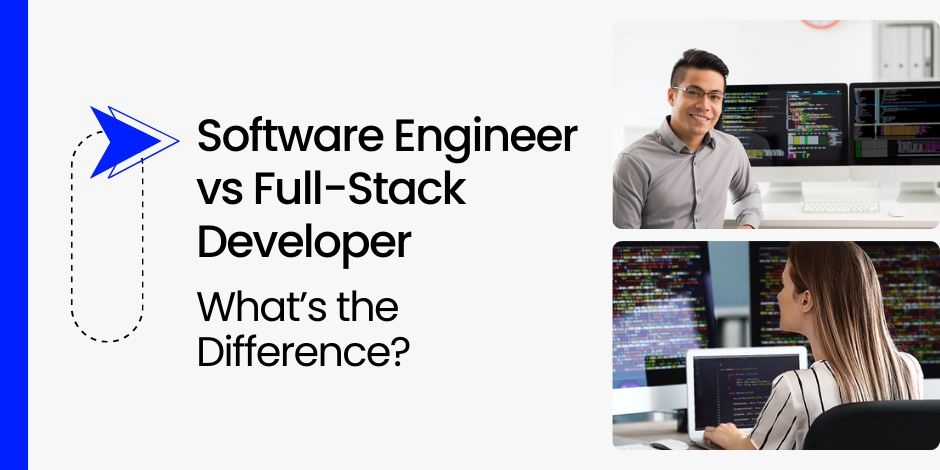Software Engineer vs Full-Stack Developer: What’s the Difference?

Stay Informed With Our Weekly Newsletter
Receive crucial updates on the ever-evolving landscape of technology and innovation.
In the ever-evolving world of technology, the distinction between a software engineer and a full-stack developer is frequently blurred, leading to confusion and misconceptions about their roles.
While both involve building software applications, they encompass distinct responsibilities and skill sets.
Understanding the differences between these roles is crucial for individuals embarking on a career in the tech industry.
Let’s delve deeper into the differences between software engineers and full-stack developers to gain a clearer understanding of what sets them apart.
Understanding the roles: software engineer vs full-stack developer

When it comes to the world of software development, there are various roles that professionals can take on. Two common roles often in discussions are software engineer and full-stack developer.
While these roles may seem similar at first glance, they have distinct responsibilities and skill sets. Let’s take a closer look at each role to gain a better understanding.
Defining the role of a software engineer
Software engineers are the architects behind the software applications that we use daily.
They are responsible for designing, developing, and maintaining these applications, ensuring that they meet the needs of users and businesses alike.
To excel in this role, software engineers possess a deep understanding of coding languages and software development principles.
One of the key aspects of a software engineer’s role is analyzing complex problems. They are skilled at breaking down intricate issues into smaller, more manageable components.
This analytical mindset allows them to design algorithms that efficiently solve these problems. Once the algorithms are in place, software engineers write code that brings these solutions to life.
However, software engineering is not just about writing code.
These professionals also work closely with product managers and stakeholders to ensure that software projects align with business requirements and objectives.
This collaboration is essential in creating software solutions that truly meet the needs of the end-users.
Responsibilities of a software engineer
Software engineers undertake a range of responsibilities throughout the software development lifecycle.
They gather and analyze user requirements, collaborate with cross-functional teams to define software specifications and create detailed technical designs.
Software engineers write clean and maintainable code and conduct rigorous testing to ensure software quality.
They also provide ongoing support and troubleshooting to identify and fix any issues that may arise.
Defining the role of a full-stack developer
While software engineers focus on the overall design and development of software applications, full-stack developers take a more comprehensive approach.
They possess a well-rounded skill set that allows them to handle both front-end and back-end development.
Front-end development involves creating the user-facing components of a website or application.
This includes designing the layout, implementing user interfaces, and ensuring a seamless user experience.
Full-stack developers are proficient in web development frameworks such as React, Angular, or Vue.js, enabling them to create visually appealing and user-friendly interfaces.
On the other hand, back-end development deals with the server side of things.
Full-stack developers are well-versed in server-side technologies such as Node.js, Python, or Ruby on Rails.
They are responsible for handling data storage, managing databases, and implementing server-side logic.
This knowledge allows them to create robust and scalable back-end systems that support the front-end components.
Responsibilities of a full-stack developer
Full-stack developers have a diverse set of responsibilities that encompass both front-end and back-end development.
They create responsive user interfaces using HyperText Markup Language (HTML), Cascading Style Sheets (CSS), and JavaScript frameworks.
Full-stack developers design and develop server-side applications, manage databases, and handle the deployment of web applications.
They also optimize the performance of websites by implementing caching mechanisms and streamlining server-side processes.
Essential skills for a software engineer

Software engineers must have a strong foundation in programming languages such as Java, Python, or C++.
They need to be proficient in software development methodologies, version control systems, and debugging techniques.
Additionally, software engineers should possess excellent problem-solving and analytical skills to identify and resolve complex software issues.
Effective communication and collaboration skills are also essential for working in cross-functional teams.
Essential skills for a full-stack developer
Full-stack developers need expertise in both front-end and back-end technologies.
They should have experience with HTML, CSS, and JavaScript frameworks such as React or Angular for creating engaging user interfaces.
On the back end, full-stack developers should be familiar with server-side languages such as Node.js or Ruby on Rails. Knowing databases like MySQL or MongoDB and proficiency in deploying web applications are also crucial for full-stack developers.
Comparing career paths: software engineer and full-stack developer

Career progression for a software engineer
Software engineers have diverse career paths that depend on their expertise and interests.
They can specialize in areas such as web development, mobile app development, artificial intelligence, or cyber security.
As they gain experience, software engineers can take on leadership roles like technical leads, software architects, or project managers.
They also have the opportunity to work in various industries such as finance, healthcare, or e-commerce.
Career progression for a full-stack developer
Full-stack developers have versatile career paths that allow them to excel in both front-end and back-end roles.
They can advance their skills in specific areas such as user experience design or database management.
Full-stack developers who demonstrate expertise in multiple technologies and frameworks often become sought-after technical leads or solution architects.
Their well-rounded skill set opens doors to exciting opportunities across industries and companies of all sizes.
In conclusion
While software engineering and full-stack development share similarities, each role offers unique challenges and opportunities.
Software engineers focus on the overall software development process, working closely with stakeholders to deliver robust and efficient solutions.
On the other hand, full-stack developers have a broader skill set, combining both front-end and back-end development to build seamless user experiences.
Both roles are critical in the tech industry, offering promising career paths and competitive salaries.
Whether you choose to become a software engineer or a full-stack developer, you can begin the journey right here with our Software Engineering program designed for full and part-time students.
Additionally, we invite you to schedule a complimentary career consultation with a member of our team if you would like to discuss our programs in more detail.




